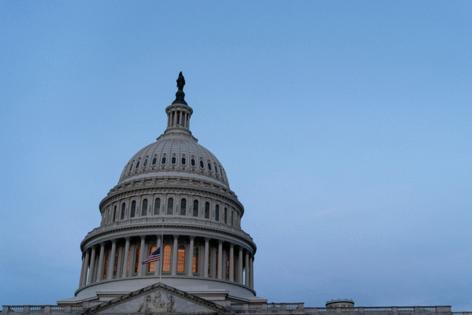House passes bill to limit nationwide injunctions
Published in Political News
WASHINGTON — The House passed a bill Wednesday that would curtail the power of federal district judges to issue nationwide injunctions, the most high-profile legislative pushback from Republicans to a string of rulings that have stymied certain executive actions from the Trump administration.
The chamber voted 219-213 to approve a bill that would stop those judges from handing down injunctive relief orders that apply to parties that are not involved in the case, except in certain situations. The measure, for example, has an exception for certain cases brought by multiple states.
The legislation now moves to the Senate, where Democrats on the Senate Judiciary Committee last week showed no signs of supporting a Republican push to limit nationwide injunctions.
Republicans this Congress have lambasted the injunctions as overstepping judicial power and say the rulings are stalling the agenda of a duly elected president, while Democrats argue the courts have been an important check on illegal or unconstitutional moves from a reckless Trump administration.
Lawmakers on both sides of the aisle chipped away at each other’s arguments in a floor debate Tuesday on the bill introduced by Rep. Darrell Issa, R-Calif.
Issa, who leads a House Judiciary subcommittee on the courts and other topics, said on the floor that the current situation empowers individual judges to dictate national policy and to “thwart the Constitution.”
“National injunctions are being used to halt executive actions and executive orders, not just for plaintiffs before the court, but across the entire country,” including for “individuals and entities that are not even parties to the litigation, and in many cases may not favor the outcome and would not have been willing plaintiffs,” Issa said.
Rep. Jamie Raskin of Maryland, the top Democrat on the House Judiciary Committee, said judges have explained “in painstaking detail” what is unlawful about Trump’s executive orders and actions. Raskin also pointed to the number of cases in which courts have issued relief.
“But if it seems like an incredible number of cases to lose in less than 100 days, recall that Trump is engaged in a record number of illegal actions at a breathtaking velocity never seen before in U.S. history,” Raskin said.
Republicans have pursued a multifaceted approach on the issue of national injunctions.
Sen. Charles E. Grassley, R-Iowa, the head of the Senate Judiciary Committee, rolled out a bill that he says would restrain lower courts’ ability to hand down “universal injunctions.”
And Rep. Jim Jordan, R-Ohio, the chairman of the House Judiciary Committee, has urged House appropriators to consider including language in fiscal 2026 funding bills that would “address the abusive use of nationwide injunctions.”
Jordan, in an interview, said lawmakers should use “every tool” they have, “which is oversight, legislation and power of the purse.”
“I think we have a good relationship with the appropriation committee,” Jordan said.
In passing the House bill, Republicans chose a less punitive response compared to calls to impeach Judge James E. Boasberg of the U.S. District Court for the District of Columbia, which was called for by right-wing lawmakers and Trump.
Boasberg was the federal judge who had ordered a temporary halt to the removal of all noncitizens in U.S. custody who were targeted under the administration’s proclamation based on the 1798 law known as the Alien Enemies Act.
©2025 CQ-Roll Call, Inc., All Rights Reserved. Visit cqrollcall.com. Distributed by Tribune Content Agency, LLC.




























































Comments